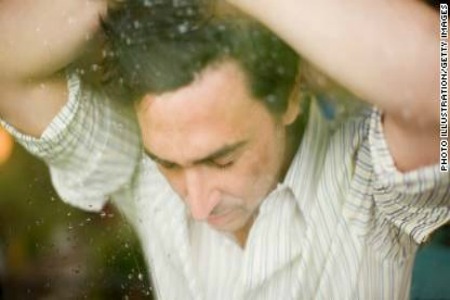
As if the havoc rain wreaks on my hair weren’t sufficient… how many times can I suffer actual physical pain — in the form of a throbbing, debilitating headache — during a thunderstorm before I can officially blame the weather for it?
Considering that more than 30 million people in the U.S. suffer from excruciating migraines, verifying the possible link between seasonality and headaches is no joke (especially since I’ve already cut out other well-known triggers, such as red wine and chocolate — to no avail).
I asked pain management experts to weigh in on this connection: Do weather changes spur on my migraines, or is this rumor full of hot air?
If you suffer from headaches, then warm weather, drastic temperature changes, low barometric pressure and even lightning bolts are not your friends. Scientists are still trying to figure out the precise mechanism behind weather-induced migraines, but the link is genuine.
“It may be that people who get migraines are very susceptible to any fluctuation, whether it’s weather change, foods, sleep or stress,” says Dr. Carolyn Bernstein, clinical director of the Harvard Medical Faculty Physicians’ Comprehensive Headache Center at Harvard’s Beth Israel Deaconess Medical Center in Boston and author of “The Migraine Brain.”
“Many patients do report worsening migraines with acute storms. Here in Boston, I have seen a spike in migraines for my patient population each August during hurricane season.”
But not all types of headaches are influenced by climate, says Dr. Vincent Martin, professor of medicine at the University of Cincinnati. Only those toe-curling migraines — the ones that make me sensitive to light and sound and can cause nausea or vomiting — are triggered by meteorological change. Good times, right?
“It is possible that weather directly changes the brain chemistry of patients with migraine, lowering feel-good serotonin levels,” says Martin. “Another possibility is that falling barometric pressure might activate the trigeminal nerve in the sinuses or eye that could initiate a migraine attack.”
Springtime can be particularly bad for migraine-sufferers, adds Martin. Not only can allergies to pollen lead to head pain, but lightning — brought on typically by rainstorms in warmer months — can, too.
In a new study in the journal Cephalagia (coauthored by Martin), researchers saw a 28% increased risk of migraine on days when lightning struck within 25 miles of a sufferer’s home.
I know what you’re thinking: Since we can’t change the weather, are migraine-sufferers doomed to duck each time lightning strikes? Not necessarily, say the experts. “We think the effect of triggers on migraines is additive,” says Martin.